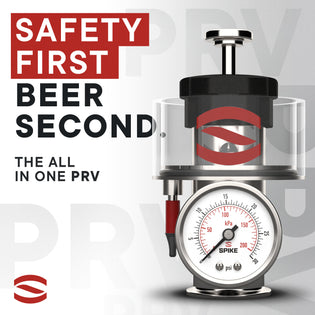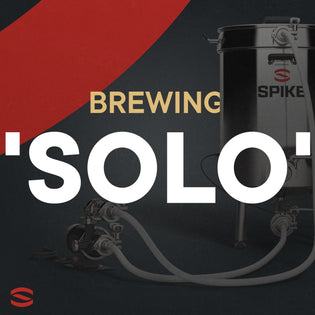By Josh Lindquist
Unleashing a cascade of bubbles, a shimmering amber allure, and a symphony of flavors - that's the magic of beer. But what if I told you, the joy isn't just in sipping that perfectly crafted pint, but also in brewing it?
Hi, I’m Josh from Spike, and we’re going to chat about the best hobby in the world! Whether you're a craft beer aficionado or a newcomer to the world of ales and lagers, homebrewing can offer a rewarding, hands-on experience that takes your love for beer to the next level.

So, grab a pint, sit back, and let's explore why homebrewing might just be your next passion project. It's time to dive into the brew-tiful journey that awaits!
1. Brewing Beer at Home is Fun
Homebrewing, much like my experiences with rock climbing, is an exercise in fun, exploration, and constant discovery. Each batch is an opportunity to try something new, like crafting a unique IPA with fruity undertones, or maybe a rich stout that’s as dark as a moonless night. There's always a new summit to conquer, a new recipe to perfect.
2. Saves Money
Without a doubt! While your initial outlay on brewing equipment may feel significant, in the long run, you'll discover that crafting your own beer can be much more economical than regularly purchasing six-packs or growlers from your local brewery. It's a bit like dining at home versus eating out; the initial cost of kitchenware and ingredients might be high, but the savings accumulate over time. Brewing your own beer offers a similar advantage – with every batch, you'll notice more pennies staying in your pocket.
3. Promotes Creativity
Much like composing a melody on a guitar, brewing is an art. It's a chance to get those creative juices fermenting, from designing unique recipes, combining unusual flavors, to even crafting your own beer labels. The sky (or should I say, the brew kettle) is the limit.
4. Never Stop Learning
This hobby can teach you a ton about science, history, and culture. Understanding the fermentation process, the origin of different beer styles, and even the cultural significance of beer in various societies can make you feel like a beer archaeologist. It's like decoding hieroglyphs on a cave wall, but the artifact is a pint of beer!
5. Enhances Appreciation for Craft Beer
Brewing your own beer will deepen your understanding and respect for the craft. Each sip of a commercially available beer becomes a learning experience, as you'll start to discern the flavors and techniques used in its creation. It's the difference between viewing a mountain from afar and intimately knowing its crags from numerous climbs.
6. Social Activity
Sharing a bottle of your homemade brew is a wonderful ice-breaker. Joining a local homebrew club or attending beer tasting events can open up a whole new social scene. Plus, who doesn't love a good brew-and-banter session?
7. Stress Relief
In this fast-paced world, brewing your own beer can provide much-needed mindfulness and relaxation. The methodical, deliberate steps of brewing are like the calm, focused stance of an archer - the world fades away, leaving only you and your craft.
8. Encourages Sustainability
By brewing your own beer, you have control over your environmental impact. You can choose organic ingredients, minimize packaging waste, and even compost spent grains. It’s one more step toward being a more conscious, eco-friendly beer drinker.
9. Leads to a New Career Path
Many professional brewers started as homebrewers. If you find that you have a real knack and passion for brewing, it could open doors to a new career or side hustle. Remember, the steepest mountain trails often lead to the most exhilarating views.
10. Boosts Confidence
Just like nailing that difficult rock climbing route, successfully brewing your first batch of beer is a massive confidence boost. Each small victory in your brewing journey can help you to believe in your ability to learn, grow, and conquer new challenges.
Wrap It Up
And there we have it! A roundup of ten irresistible reasons to dive headfirst into homebrewing. Whether you're already captivated by the world of craft beers, a DIY devotee looking for the next exciting project, or a curious explorer hunting for a fresh, creative outlet, homebrewing presents a perfect blend of challenge, creativity, and profound gratification.
So, let's raise a glass to the brewing adventures that lie ahead. After all, every great journey begins with a single sip!
FAQs
How much does it cost to start homebrewing?
Starting costs can vary based on the scale of your brewing setup. At Spike we offer products for the complete beginner to the Nano Brewery scale. Check out our quizzes on our site and reach out to our Customer Service team so we can help find the right equipment for you!
Is it legal to brew beer at home?
In most places, yes, but it's essential to check your local laws and regulations regarding homebrewing.
How long does it take to brew beer at home?
From brew day to sipping your homemade beer, it typically takes about 4-6 weeks depending on the beer style. The brew day takes approximately 4-6 hours, with different beer styles taking several weeks to ferment.
Can I sell my beer?
Most jurisdictions have specific laws governing the sale of homemade alcohol. In many places, it's illegal without the proper licenses and permits.
What's the difference between ale and lager in homebrewing?
The main difference comes down to the type of yeast and fermentation temperatures. Ales use top-fermenting yeast and ferment at warmer temperatures, while lagers use bottom-fermenting yeast and ferment at cooler temperatures. Each offers a unique flavor profile and characteristics.
What are the basic ingredients needed for homebrewing?
Every beer recipe differs, but the four fundamental ingredients remain the same: water, malted grain (usually barley), hops, and yeast. The balance and varieties of these ingredients are what create the diverse world of beer flavors we enjoy. Check out Spike’s recipe section on our website! We have curated fantastic catalog of brews from expert brewers.
What equipment do I need to start homebrewing?
For beginners, a basic homebrewing kit is recommended. This usually includes a kettle with a heating source, fermenter, thermometer, and cleaning supplies. As you advance, you can invest in more specialized equipment.
Can I create my own homebrew recipes?
Absolutely! Part of the joy of homebrewing is the experimentation. You can alter existing recipes or create entirely new ones. Remember, the best beers often come from a brewer's unique creativity.
Is it safe to homebrew?
Yes, it's safe as long as you follow some basic rules. Cleanliness is crucial to preventing bacterial contamination, and careful handling of equipment. Always use caution when working with boiling water and any pressure during fermentation.
Can I homebrew other types of alcohol, like cider or wine?
Definitely! While the process and ingredients differ, the principles of fermentation are the same. Many homebrewers expand into making cider, wine, or even mead.
What is the role of hops in brewing?
Hops play multiple roles in beer making. They add bitterness to balance the sweetness from malt, contribute to the beer's aroma, and have antiseptic properties that can prolong the beer's shelf life.
Can homebrewing be a family activity?
While the consumption of the final product is reserved for those of legal drinking age, the brewing process itself can definitely be a family affair. There's plenty of opportunity to teach kids about the science behind brewing, and they can help with tasks like bottle cleaning and label designing.
How do I improve my homebrew over time?
The key to improvement is simple - practice! As with any craft, the more you do it, the better you'll get. Take notes on each batch, including what worked and what didn't, and don't be afraid to seek advice from fellow homebrewers or online communities.
How do I store my homebrewed beer?
After the beer is bottled and capped or kegged, it should be stored upright in a cool, dark place. Once refrigerated let it remain at that temperature. Proper storage will help the beer age correctly and maintain its flavor.
Josh Lindquist is the Continuous Improvement Manager at Spike Brewing. When he’s not immersed in his work (which he absolutely loves by the way) he can be found rock climbing, playing sand volleyball or researching the hottest trends on the newest tech gadgets.






